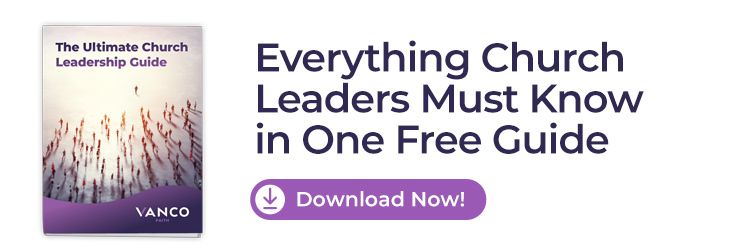
Whether you’re a pastor wondering if your salary reflects your effort, a church leader balancing a budget or just curious about clergy compensation, you’re in the right place. The truth about how much pastors make a year varies wildly, from small rural churches to sprawling megachurches. But what influences those numbers? Church size, location, denomination and even perks like housing allowances all play a part. In this guide, we’re pulling back the curtain on pastor pay, breaking down averages, trends and what it all means for you. Curious? Keep reading for all the answers.
Table of Contents
- What Is the Average Pastor Salary?
- Pastor Salary by Church Size
- How Much Do Pastors Make a Year?
- Factors That Affect Pastor Income
- Pastor Benefits and Housing Allowances
- Pastor Salary Guide and Negotiation Tips
- Free eBook: Everything Church Leaders Should Know in One Guide!
What Is the Average Pastor Salary?

According to Indeed, the average pastor has a salary of $51,371 in the United States. The U.S. Bureau of Labor Statistics states that the median pastor salary is $58,920. However, there are contributing factors to consider that determine how much a pastor makes each year, including church size, location and role. Indeed’s clergy salary statistics show that salaries for church pastors can range from $31,933-$82,536, which is determined by the pastor’s position. For example, the salary of a pastor may be influenced by these circumstances:
- Size and financial stability of the congregation
- Cost of living in various locations
- Pastor’s level of education and experience
Pastor Salary by Church Size
Small Churches (Under 150 Members)
Small churches with 150 members or less do not have as much money to contribute as bigger churches, so pastor compensation for smaller churches is expected to be lower than for bigger churches. However, the church’s location and pastor’s role contribute to the overall salary. Lifeway is a useful resource to find specific data on church size salary breakdowns.
According to REACHRIGHT, a small church senior pastor salary can range from $35,494-$67,221 in congregations with 150 members or less.
Medium-Sized Churches (150-500 Members)
As churches grow in congregation size to medium-sized churches of 150-500 members, pastor compensation increases to around $30,000-40,000 more than small churches. REACHRIGHT states that senior pastors in medium-sized churches with 150-500 members can make salaries of $75,624-$96,656.
Large Churches (501-999 Members)
Churches with larger budgets, which require more responsibilities from pastors, compensate with higher salaries. REACHRIGHT shows that senior pastors in large churches with 501 to 999 members have an average salary of $120,485.
Megachurches (Over 1,000 Members)
According to REACHRIGHT, a senior pastor in a megachurch with 1,000 members or more can make an average of about $162,761. Pastors serving in megachurches tend to receive the best salaries and church leader compensation. These are a few of the benefits of serving in a megachurch:
- Substantial housing allowances that reduce living expenses
- Generous health insurance, retirement contributions and paid sabbaticals
- Bonuses based on the growth of church funds
How Much Do Pastors Make a Year?
Senior Pastors
Senior pastors have more leadership responsibilities, including:
- Delivering sermons and guiding the congregation through spiritual transformations
- Managing church administration by monitoring the operation, programs and personnel
- Analyzing and improving the goals and mission of the church and congregation to strategize new methods
- Supporting and counseling members of the church to guide them through their personal struggles
Higher salaries compensate for the greater responsibilities that senior pastors perform. A worship leader in a large congregation makes significantly less than a senior pastor in a church with the same number of members. According to Sapling, senior pastors make $92,255-$189,053. The varying salaries reflect the difference in roles and experience.
Associate Pastors
The role of an associate pastor is to support and assist the senior pastor in their responsibilities, including:
- Assisting with teaching and preaching as needed
- Providing counseling and aid to congregation members who need assistance
- Leading specific ministries and helping to organize and plan events
- Building a connection between the community and church
Although these responsibilities may overlap with the duties of a senior pastor, associate pastors do not carry the same weight as senior pastors. Senior pastors are responsible for managing the congregation's overall operation, while associate pastors help with some of those responsibilities. Sapling’s statistics show that associate pastors make $45,999-$62,745 in large congregations, which is significantly lower than the compensation for senior pastors.
Youth and Children’s Pastors
Children’s pastors have fewer responsibilities and because they focus on performing a specific set of skills, they are not responsible for general management of the church as senior pastors are. Nevertheless, children’s pastors carry a crucial responsibility to strengthen the children in the church, including:
- Teaching lessons targeted for the age of the children
- Helping children form spiritual momentum
- Developing sermons and activities for the children’s program
The role of a children’s pastor is vital; however, the narrower set of responsibilities means lower salaries. According to Ministry Designs, a children’s pastor salary average is around $46,000 the United States.
Full-Time vs. Part-Time Pastors
Full-time pastors in churches with stable resources have access to benefits and salaries, while part-time pastors do not. These benefits may include health insurance, housing allowances and retirement plans. According to Indeed, the average full-time pastor salary is $51,371.
Some churches do not have the resources to afford full-time pastors, so they rely on part-time pastors, which significantly lowers their compensation packages for pastors. Although part-time pastors are beneficial to low-income churches, these pastors might struggle to balance other jobs with their ministry duties. Some churches might even require their part-time pastors to handle more responsibilities than their limited hours allow. Unlike full-time pastors, part-time pastor wages often match local part-time compensation rates.
While full-time pastoral positions provide stability, pastors in part-time roles may face financial constraints, limited or no benefits and high expectations.
Factors That Affect Pastor Income
External factors such as region, denomination, experience and education also contribute to overall pastor income. Let’s look at how different circumstances affect pastor salaries.
Regional Salary Differences
Urban areas typically pay their pastors more because living expenses are higher. For example, housing in states like New York or California has significantly higher costs than rural areas, so urban congregations compensate their pastors accordingly.
Denominational Trends
Denominations set their own salary guidelines, so salary expectations for pastors vary depending on the religious group.
The salary of a Baptist pastor varies according to their individual qualifications and other determining factors. According to Christian.net, the average salary of a Baptist pastor is $40,000-$70,000 annually. Baptist pastors with extensive experience, advanced degrees or specified training may have higher salaries than other pastors.
According to the NC Conference of the United Methodist Church, full-time pastors in the Methodist church have a minimum salary of $48,320. These guidelines ensure consistency among Methodist churches across the United States. Still, factors like regional location and other aspects may increase the salary of a pastor.
Unlike some congregations, the Catholic church pays for the living expenses of their clergy (housing, food and other necessities), so their salaries may appear significantly lower than other congregations. According to Catholic Diocese of Dodge City, active priests can expect a salary of approximately $33,348.
Experience and Education
Years of experience and advanced theological degrees can make a significant difference in the salary of a pastor. Pastors with extensive experience can negotiate higher pay because they provide outstanding value and skill sets, including:
- Leadership
- Pastoral care for the community
- Administrative expertise
Theological degrees like Master of Divinity or Doctor of Ministry create opportunities for higher pay. Nevertheless, when analyzing pastor pay by denomination, compensation varies. According to an article by C. Kirk Hadaway and Penny Long Marler, the Episcopal Church is the most educated and wealthy Protestant church, so its pastor compensation is extremely high.
Additionally, regional pastor salary differences show how location affects pastors’ earning potential. Even wealthy denominations determine the salary of their pastors based on their locations.
Pastor Benefits and Housing Allowances
Pastors often receive benefits like housing allowances, retirement plans and tax advantages. These benefits may impact a pastor’s overall income because they cover the pastor’s immediate needs. For example, a pastor’s housing allowance enables them to designate this income as tax-exempt, which means that a portion of their overall income is not taxable. This provides financial relief on living expenses.
Moreover, the pastor benefits package might include contributions to a retirement plan, which may also be tax-exempt. This provides even greater relief to a pastor’s financial burden. Other benefits like health insurance and allowances for pastoral expenses contribute to their financial well-being.
All these benefits provide stability and less taxable income, which increases the overall net earnings of a pastor.
Pastor Salary Guide and Negotiation Tips
Tools for Benchmarking Salaries
Whether you are a pastor preparing to negotiate a salary or a church trying to determine fair pay, there are resources to guide you. Use these tools to help you determine a fair salary:
- Compensation calculators, like ChurchSalary
- Reports on salary averages, like the U.S. Bureau of Labor Statistics
- Information on church financial stability, with Lifeway
Tips for Salary Negotiation
Here are a few pastor negotiation tips that can help you feel more confident:
- Express gratitude for the opportunity to serve and your dedication to your ministry.
- Share your research and how it aligns with the salary you are requesting.
- Stay open-minded. Be willing to compromise and explore innovative solutions.
Free Church Leadership Guide to Advance Your Unique Mission
Our team painstakingly gathered the data, best practices and strategies your church's leadership team needs, organizing them into this essential and free eBook.
Download our free eBook to learn…
- What to avoid
- How to set SMART goals
- Leadership model structures to inspire your church leadership strategy
- How to recruit volunteers and delegate
- How to handle challenging situations such as disgruntled church members or staff
- How to be a good financial steward for your church
- And more!










